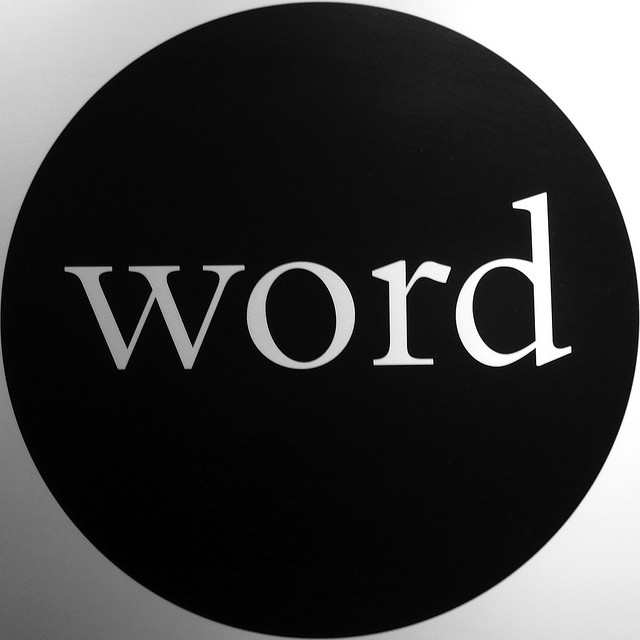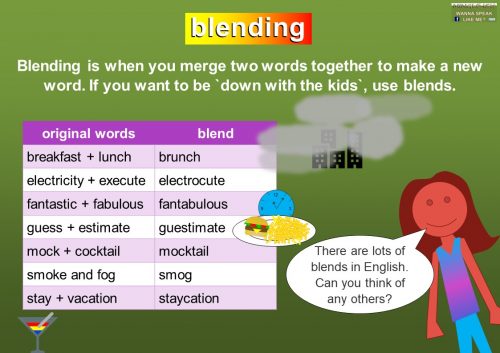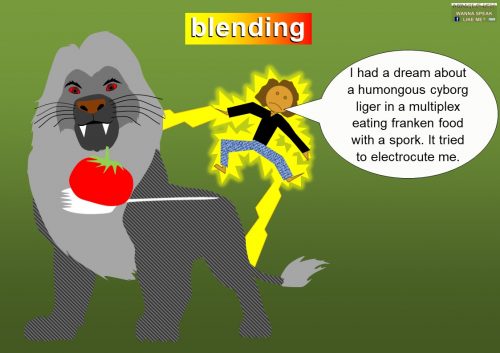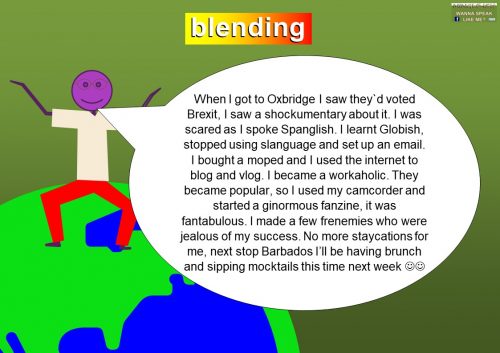Learn More With These Definitions and Examples
Updated on February 05, 2020
A word blend is formed by combining two separate words with different meanings to form a new one. These words are often created to describe a new invention or phenomenon that combines the definitions or traits of two existing things.
Word Blends and Their Parts
Word blends are also known as portmanteau (pronunciation port-MAN-toe), a French word meaning «trunk» or «suitcase.» Author Lewis Carroll is credited with coining this term in «Through the Looking-Glass,» published in 1871. In that book, Humpty Dumpty tells Alice about making up new words from parts of existing ones:
«You see it’s like a portmanteau—there are two meanings packed up into one word.»
There are different ways of creating word blends. One way is to combine portions of two other words to make a new one. These word fragments are called morphemes, the smallest units of meaning in a language. The word «camcorder,» for example,» combines parts of «camera» and «recorder.» Word blends can also be created by joining a full word with a portion of another word (called a splinter). For example, the word «motorcade» combines «motor» plus a portion of «cavalcade.»
Word blends can also be formed by overlapping or combining phonemes, which are parts of two words that sound alike. One example of an overlapping word blend is «Spanglish,» which is an informal mix of spoken English and Spanish. Blends can also be formed through the omission of phonemes. Geographers sometimes refer to «Eurasia,» the landmass that combines Europe and Asia. This blend is formed by taking the first syllable of «Europe» and adding it to the word «Asia.»
The Blend Trend
English is a dynamic language that is constantly evolving. Many of the words in the English language are derived from ancient Latin and Greek or from other European languages such as German or French. But starting in the 20th century, blended words began to emerge to describe new technologies or cultural phenomena. For instance, as dining out became more popular, many restaurants began serving a new weekend meal in the late morning. It was too late for breakfast and too early for lunch, so someone decided to make a new word that described a meal that was a little bit of both. Thus, «brunch» was born.
As new inventions changed the way people lived and worked, the practice of combining parts of words to make new ones became popular. In the 1920s, as traveling by car became more common, a new kind of hotel that catered to drivers emerged. These «motor hotels» quickly proliferated and became known as «motels.» In 1994, when a rail tunnel beneath the English Channel opened, connecting France and Great Britain, it quickly became known as the «Chunnel,» a word blend of «Channel» and «tunnel.»
New word blends are being created all the time as cultural and technological trends emerge. In 2018, Merriam-Webster added the word «mansplaining» to their dictionary. This blended word, which combines «man» and «explaining,» was coined to describe the habit that some men have of explaining things in a condescending manner.
Examples
Here are some examples of word blends and their roots:
| Blended word | Root word 1 | Root word 2 |
| agitprop | agitation | propaganda |
| bash | bat | mash |
| biopic | biography | picture |
| Breathalyzer | breath | analyzer |
| clash | clap | crash |
| docudrama | documentary | drama |
| electrocute | electricity | execute |
| emoticon | emotion | icon |
| fanzine | fan | magazine |
| frenemy | friend | enemy |
| Globish | global | English |
| infotainment | information | entertainment |
| moped | motor | pedal |
| pulsar | pulse | quasar |
| sitcom | situation | comedy |
| sportscast | sports | broadcast |
| staycation | stay | vacation |
| telegenic | television | photogenic |
| workaholic | work | alcoholic |


English speakers are very creative when it comes to making up new words by combining parts of words that already exist. For example, most people know that “brunch” is a combination of “breakfast” and “lunch”, but did you know that “smog” comes from “smoke” and “fog”?
There are lots and lots of such words in English, many more than in other European languages. One of the reasons for that is, of course, that English has many more speakers than other European languages (with the exception of Spanish), so there are more people who can potentially create a catchy new word.
Nevertheless, I believe that the main reason is much more pragmatic. English is a fairly analytic language, which in linguistic jargon refers to a language that, simply put, conveys the function of a word using word order and things like prepositions rather than endings and prefixes. Words in English are thought of as isolated units, whereas words in other European languages often carry additional information, and it is much easier to merge two isolated units than to merge two words carrying a lot of additional information, some of which would inevitably be lost during merging.
But enough of that theoretical nonsense. Let’s take a look at actual examples of such words in English.
English portmanteaus
A portmanteau is a type of blend word in which the beginning of one word is combined with the final part of another word. For example, it may surprise you that the word “bit” used in computing (as in “megabit”) is a portmanteau of ”binary” and “digit” (its development was probably influenced by the fact that “bit” already was an English word meaning a small amount of something). Sometimes the two parts may overlap, e.g. “smash”, which is composed of “smack” and “mash” with “ma” connecting the two parts.
Let’s take a look at some of the most common portmanteaus in English that are more or less accepted (note that the list excludes brand and product names, which are often based on a portmanteau):
alphanumeric = alphabetic + numeric
advertorial = advertisement + editorial
bit = binary + digit (only in computing)
brainiac = brain + maniac
breathalyzer = breath + analyzer
Brexit = Britain + exit
brunch = breakfast + lunch
camcorder = camera + recorder
dumbfound = dumb (mute) + confound
electrocute = electro- + execute
email = electronic + mail
emoticon = emotion + icon
endorphin = endogenous + morphine
fanzine = fan + magazine
forex = foreign + exchange
guesstimate = guess + estimate
infomercial = information + commercial
keytar = keyboard + guitar
labradoodle = labrador + poodle
mechatronics = mechanics + electronics
metrosexual = metropolitan + heterosexual
moped = motor + pedals (borrowed from Swedish)
motel = motor + hotel
napalm = naphthenic + palmitic
Oxbridge = Oxford + Cambridge (used in the UK to refer collectively to the University of Oxford and the University of Cambridge)
newscast = news + broadcast
paratrooper = parachute + troop + -er
phablet = phone + tablet
pulsar = pulsating + star
sexting = sex + texting
sheeple = sheep + people
smash = smack + mash
smog = smoke + fog
Spanglish = Spanish + English
televangelist = television + evangelist
transistor = transconductance or transfer + resistor
vlog = video + blog (itself a shortening of web + log)
vitamin = vital + amine (introduced by a Polish biochemist when it was thought that all vitamins contained an amino acid)
webinar = web + seminar
workaholic = work + -a- + alcoholic
There is also an archaic word “cameleopard”, composed of “camel” and “leopard”, which means “giraffe”. If you are interested in the history of that word (and of the word “giraffe”), you can read my article about them.
Blend words combining the beginnings of two words
Another type of blend words, which are less common than portmanteaus in English, is formed by taking the first part of one word, the first part of another word, and merging them into one word. Here are the most common such words:
Amerind = American + Indian (referring to native Americans)
botox = botulism + toxin
cyborg = cybernetic + organism
cosplay = costume + play
hazmat = hazardeous + mataterial
modem = modulator + demodulator
sitcom = situation + comedy
Subscribe to my educational newsletter
to receive a weekly summary of new articles
Enter your email address below:
Please, enter a valid email address:
You tried to submit the form very quickly after opening this page. To confirm that you are a human, please, click on the button below again:
Use the image
You can use the image on another website, provided that you link to the source article. If you share it on Twitter or Facebook, I kindly ask you to tag my profile @JakubMarian.
If you share it on reddit, please, share a link to the whole article and give credit to my subreddit r/JakubMarian in the comments.
Image by Procsilas Moscas on Flickr.com.
Like all languages, the English language is constantly evolving, changing and having new words added. One of the ways new words are added to English is by creating “blended words.” These are some of my favorite English words!
Blended words are a lot of fun if you ask me. To make a blended English word you take two existing words and combine the letters in a way to make a new word. The new word then represents a combination of the sounds and meanings of the two original words, but has its own unique meaning too!
Making blended words sounds like fun right? Some blended words in English are so common, most native English speakers forget they are a combination of two existing words. A lot of blended words in English started out, or still remain, slang/informal words, but some blended words have worked their way into dictionaries and common use.
One of the reasons I like blended words so much is because they show linguistic creativity! Blended words are symbols of how languages grow, change, and reflect current culture.
Here are is a list of common blended words in English:
blog (web + log) = a regularly updated website, typically one run by an individual or small group, that is written in an informal or conversational style – this is a BLOG!
brunch (breakfast + lunch) = a large meal eaten at a time between breakfast and lunch, replacing the two meals with one instead. (Eating brunch is very common on weekend days in America.)
cyborg (cybernetic + organism) = a hypothetical human being with physical abilities that are beyond a normal human because mechanical elements have been built into the body.
emoticon (emotion + icon) = keyboard symbols used to represent facial expression such as : – ) = 🙂
frenemy (friend + enemy) = a person who is a friend even though there is an underlying dislike or rivalry in the relationship
glamping (glamorous + camping) = high class camping, often in cabins or indoor structures, instead of tents, with many modern amenities, such as electricity, running water, cable TV and internet
humongous (huge + monstrous) = very big, both of these words mean large so putting the two words together indicates that something is extremely big
Internet (international + network) = the global communication network that allows computers around the world to connect and share information
mocktail (mock + cocktail) = a cocktail that has no alcohol in it, mock = fake, so this is like a fake cocktail
motel (motor + hotel) = a building with accommodations, meals, and other services for travelers, often (or originally) found along motorways or highways as opposed to in towns
smog (smoke + fog) = air pollutant often found in large cities
Spanglish (Spanish + English) = a mix of words and idioms from both Spanish and English, often used by people who know both languages well
spork (spoon + fork) = an eating utensil that is shaped like both a spoon and fork, often has a rounded spoon shape with short prongs at the end like a fork
staycation (stay + vacation) = a budget-friendly alternative to a vacation in which people stay at home during their time off from work
All of these words are somewhat resent additions to the English language, they are newly made words, from two existing words. This doesn’t mean though that we can all make up our own blended words and expect people to know what we are talking about. For example, I could make up the word: shandal (shoe + sandal), but no one would know what I’m talking about because it just isn’t an accepted or used blended word in English. So, for know we have to just use those blended words that are already out there (like those listed above) and wait to see what others develop over time. Who know, maybe shandal will someday be added to the list!
what are blend words?
Blending or blend words are one of the many ways to create a new word in English. A blend word is created by merging two existing words together to make a new word. They are very common in this day and age. Let’s take a look at some examples.
For example:
- breakfast + lunch = brunch (a meal eaten late morning instead of breakfast and lunch)
- electronic + mail = email (text communication over the internet)
- glamorous + camping = glamping (posh camping with home comforts)
- mock + cocktail = mocktail (a non- alcoholic cocktail)
- work + alcoholic = workaholic (a person who never stops working.
Have you heard of any of these before?
Here are some more examples for you to familiarise yourselves with plus an example in use.
- alcohol + pop = alcopop
example – I don’t want to get wasted tonight, so I’m only taking a couple of alcopops (said no one ever!). - bang + smash = bash
example – Let`s go on the dodgems next, I want to bash the shit out of you. - biography + picture = biopic
example – There`s a biopic on telly tonight, I’m going to stay in and watch it. - biology + electronic = bionic
example – Have you seen the news? Doctors have made a bionic body for a guy who was in a car smash. - Bombay + Hollywood = Bollywood
example – My friend is a Bollywood star. - booty + delicious = bootylicious
example – My body`s so bootylicious baby. - boxing + exercise = boxercise
example – I`m not going to boxercise tonight, I can’t be bothered. - breakfast + lunch = brunch
We`re doing brunch later this week so I’ll ask her then. - breath + analyser = breathalyser
example – Make sure you don’t have more than one drink; the cops are patrolling with breathalysers. - British + exit = Brexit
example – Who in their right mind voted for Brexit? - camera + recorder = camcorder
example – I`m definitely taking the camcorder on my safari holiday. - chuckle + snort = chortle
example – That was so funny, I couldn’t help but chortle to myself. - cybernetic + organism = cyborg
example – You need to watch Terminator, it`s about a cyborg. - documentary + shock = shockumentary
example – I was gobsmacked watching a shockumentary about drugs and crime last night. - electricity + execute = electrocute
example – Don’t touch the socket with wet hands, you`ll electrocute yourself. - electronic + mail = email
example – I just need to check my emails, then I’ll be with you. - emotion + icon = emoticon
example – I taught my mum how to use emoticons, now she keeps bombarding me with them. - fan + magazine = fanzine
example – I`ve unsubscribed to the fanzine for the club, it`s shit. - fantastic + fabulous = fantabulous
example – Darling, fantabulous party last night. I can’t wait for the next one. - Frankenstein + food = franken food
example – I`m not eating any of that franken food, just organic fruit and veg for me. - friend + enemy = frenemy
example – She`s my frenemy. We put up with each other, but I secretly hate her guts. - giant + enormous = ginormous
example – I found a shop that sells ginormous pancakes with any topping you like! - glamorous + camping = glamping
example – We`ll be glamping this year, it rained so much last year all our stuff got destroyed.
- gleam + shimmer = glimmer
example – Look at my new car glimmering in the sun. - global + English = Globish
example – My boss is sending me on a Globish course, so I can communicate better with our clients. - guess + estimate = guesstimate
example – I`d guestimate the price to be around $40 per unit. - hotel + motor = motel
example – There`s a nicer motel around the corner, let`s go there. - huge + monstrous = humongous
example – HELP! There`s a humongous spider on my bed. - international + network = internet
example – No internet for a week Timmy! If you can’t tidy your room, you can’t have internet. - lion + tiger = liger
example – Have you seen the cross between a lion and a tiger? It looks lush, it`s called a liger. - malicious + software = malware
example – You need better security on your tablet, there`s lots of malware flying around the net. - mock + cocktail = mocktail
example – Only mocktails for me tonight, I’m driving. - motor + pedal = moped
example – My son wants a moped, I said over my dead body. - multiple + complex = multiplex
example – A new multiplex cinema is being built soon. - Oxford + Cambridge = Oxbridge
example – I`m so clever, my teacher thinks I could go to Oxbridge. - parachute + troops = paratrooper
example – I`d love to be a paratrooper. - romantic + comedy = romcom
example – I`m going to make my boyfriend watch a romcom tonight, he secretly loves them. - sex + texting = sexting
example – I caught my boyfriend sexting his ex. I - slang + language = slanguage
example – Please don’t use slanguage around the boss. - smoke and fog = smog
example – The smog is so bad in Beijing, people have to wear masks. - Spanish + English = Spanglish
example – Just speak Spanglish, then we can all understand. - spoon + fork = spork
example – Have you seen a spork? It’s great for travelling. - sports + broadcast = sportscast
example – I love the Olympics, sportscasts all day! - squirm + wiggle = squiggle
example – Look at that little fish squiggling around in its tank. - stay + vacation = staycation
example – We can`t afford to go anywhere this year, so we`re having a staycation instead. - telephone + marathon = telethon
example – I`ll call you later for a catch up, we can have a telethon. - video + log = vlog
example – I need to update my vlog, my parents love seeing what I’ve been up to. - web + log = blog
example – I write a blog for a magazine. - web + seminar = webinar
example – We`ve got a webinar at 9am sharp. - work + alcoholic = workaholic
example – You need to slow down, you`re a workaholic, you`ll end up killing yourself one day.
blend words in use
I’ve made a few stories containing blend words. See if you can understand them.
blending words practice
blending words practice
08.07.2021
Английский язык постоянно развивается и обогащается новыми словами и выражениями. Англичане становятся довольно изобретательными ребятами, когда речь заходит о создании новых слов. Вы наверняка замечали в английском языке слова, которые состоят из других слов. Такие слова в английском языке получили названия blend words (от английского «blend» — смесь, смешение) или portmanteau words (от французского «чемодан»).
В русском языке есть несколько названий для подобного словообразования: слова-гибриды, смешанные слова, портмонто, слова-бумажники.
Смешанные слова могут появляться путем слияния начала одного слова и окончания другого слова. Например, английское слово «motel» (мотель) произошло от смешения начальной части слова «motor» (мотор) и окончания слова «hotel» (отель). Еще один способ образования слов-гибридов – это соединение начальной части одного слова и начальной части другого слова. К примеру, слово «sitcom» (ситком) образовалось путем объединения начальной части слова «situation» (ситуация) и начала слова «comedy» (комедия). Таким образом, два слова или части слов сливаются, образуя слово с новым значением, однако новое слово содержит лексическия значения двух слов, из которых оно возникло.
Давайте посмотрим на примеры таких слов в английском языке:
- Brexit (брексит, выход Великобритании из Евросоюза) = Britain (Великобритания) + exit (выход)
- Brunch (бранч, поздник завтрак) = breakfast (завтрак) + lunch (обед)
- Chugger (чаггер, уличный сборщик пожертвований на благотворительность) = charity (благотворительность) + mugger (уличный грабитель)
- Chunnel (транспортный тоннель под проливом Ла-Манш) = channel (канал, пролив) + tunnel (тоннель)
- Clash (столкновение, грохот) = clap (хлопок, удар) + crash (авария, удар)
- Cosplay (косплей) = costume (костюм) + play (игра)
- Email (электронная почта) = electronic (электронный) + mail (почта)
- Jeggings (джеггинсы) = jeans (джинсы) + leggings (леггинсы)
- Kidult (кидалт, взрослый ребенок) = kid (ребенок) + adult (взрослый)
- Moobs (избыточный вес на груди мужчин) = man (мужчина) + boobs (женская грудь)
- Motel (мотель) = motor (мотор, двигатель) + hotel (отель)
- Motorcade (автоколонна, автомобильный кортеж) = motor (мотор, двигатель) + cavalcade (группа всадников)
- Oxbridge (Оксбридж, университеты Оксфорда и Кембриджа) = Oxford (Оксфорд) + Cambridge (Кембридж)
- Romcom (романическая комедия) = romantic (романический) + comedy (комедия)
- Runglish (смешение русского и английского языков) = Russian (русский язык) + English (английский язык)
- Satnav (спутниковая навигация) = satellite (спутник) + navigation (навигация)
- Sitcom (ситком, ситуационная комедия) = situation (ситуация, положение) + comedy (комедия)
- Slanguage (сленг, жаргонная речь) = slang (сленг) + language (язык)
- Smog (смог) = smoke (дым) + fog (туман)
- Spanglish (смесь испанского и английского языков) = Spain (Испания) + English (английский язык)
- Vlog (видеоблог) = video (видео) + blog (блог)
- Vodcast (водкаст, видеофайлы в интернете) = video (видео) + podcast (подкаст, аудиофайлы в интернет)
- Webinar (вебинар, интернет-конференция) = web (веб, сеть) + seminar (семинар)
- Webzine (интернет-журнал) = web (веб, сеть) + magazine (журнал)
Вы наверняка слышали еще один яркий пример слияния: слово «Brangelina» (BradPitt + AngelinaJolie). Такое слияние возникает, когда пару воспринимают вместе, как одно целое.
Благодаря блендингу в английском языке можно встретить большое количество новых слов. Такой способ словообразования очень характерен именно для английского языка. Популярность blendwords нетрудно объяснять: такие слова легко создавать. Смешивание слов расширяет язык, добавляя в него новые интересные слова. В последние годы отмечается увеличение количества смешанных слов и значительная часть таких слов используется в сфере интернета и технологий.
Интернет-слова из английского языка
Ложные друзья переводчика в английском языке: примеры
Разобраться со всеми нюансами английского языка вам поможет Центр Иностранных Языков «Хогварст»
Телефон для записи + 375 33 381 00 01





